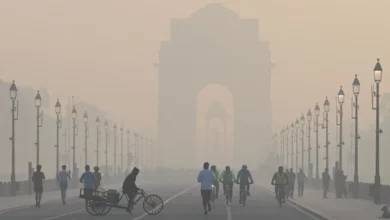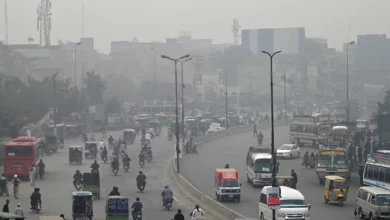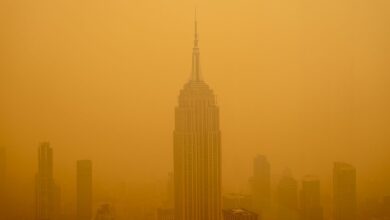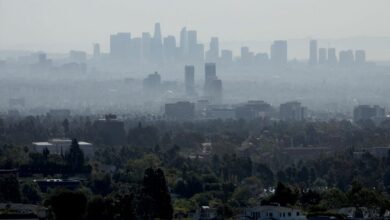As the world gathered to discuss climate change and sustainable development at the UN Rio+20 conference last week, environment specialists in Egypt say more must be done to improve government infrastructure and address the immediate health risks of pollution before the country would be able to tackle larger environmental issues.
Egypt faces a number of environmental problems — air pollution, limited access to energy and dwindling water supplies being chief among them.
“It’s really an issue of management of resources, whether energy, fuels or agricultural land,” said Sarah Refaat, the lead organizer for Egypt at 350.org, a global grassroots movement dedicated to finding solutions to the climate crisis.
“Issues like transportation and energy are vital because of the impact on economy and health, and for energy, Egypt’s policies are not sustainable at all,” Refaat claimed.
Vehicle emissions are one of the major contributing factors to air pollution in Egypt. Last year, a member of the Shura Council’s transportation committee told Egypt Independent that Cairo is home to 2.7 million cars, and that number is expected to rise as the city’s population increases.
Though government programs have attempted to curtail air pollution and create better waste management systems, activists say those efforts have fallen short.
“The government’s overall response is slow, and not as efficient as it should be,” says Refaat. “[Projects] like renewable energy are announced, but then there’s no action; it’s slow bureaucracy at best. And in terms of policy, the government remains reactionary.”
Pollution is a serious health threat. Up to 6,000 people die each year from pollution-related diseases in Egypt, while more than 30,000 people are hospitalized each year for similar causes.
A 2002 World Bank analysis said that air pollution drains an estimated $2 billion annually from the economy. Transportation fuel is the third heaviest pollutant after the burning of solid waste, which accounts for 36 percent of air pollution, and industry, which accounts for 32 percent.
The government has not been successful in its attempts to curtail the burning of agricultural waste. Each year after the rice harvest in the fall, a thick layer of smog from burning rice straw continues to spread across Cairo and the Nile valley.
Laws regulating how much and what type of pollutants industries can release do exist, but monitoring and enforcement of those laws has been poor.
According to Theodor Kulczycki, a specialist with the environmental consultancy firm EcoConServe, the laws on the books are “sufficient and fairly comprehensive” to keep the quantities of pollutants in check, but “from my experience the follow-up on making sure industrial companies aren’t [disobeying] laws is what’s lacking,” he says.
To tackle industrial pollution, Kulczycki says more emphasis must be put on community agency. “One non-sector specific thing they can work on that can really improve the quality of environmental measures is facilitating public participation,” he said.
Legally, before any construction project is granted a license, the owners must do an environmental assessment and meet with the public to discuss the likely impact. While in the West public outcry can stop big projects, in Egypt public participation is more of a rubber stamp.
“The general public is not educated or organized enough to really get together and express a clear opinion,” Kulczycki claimed. “Improving this process has shown better environmental outcomes, and putting more emphasis on the general public creates incentives for education. The people become a force necessary for the approval of a project.”
The industrial sector has run into problems before with building factories without public approval. In the port city of Damietta, controversy continues over a fertilizer factory built in 2008 by the state-owned Misr Oil Processing Company and Agrium, a Canadian fertilizer company. The factory was temporarily shut down last year after protesters claimed that pollution from the plant, which sits only a couple hundred meters from a middle-class neighborhood and schools, has devastated local fish stocks and agriculture. Critics say residents were not consulted about the construction of the factory.
For Refaat, these conflicts occur because the Ministry of Environment has an unclear mandate and little power to enforce its policies. The result, she says, is that “they aren’t doing their job, and other entities are not properly integrated into the ministry. It’s like you’re marginalizing the environment as if it’s something separate from everything else.”
Instead, she believes the ministry should be disbanded, and smaller environmental units should be installed within other government ministries to ensure that environmental impact is considered across the board.
Egypt needs to address environmental problems more inclusively, says Refaat. “[Dealing with the transportation sector] is a big opportunity to solve something that would have immediate impact, but there is still the potential for increased environmental damage in the future as climate change continues to take hold. Egypt has already seen the impact of climate change on agriculture. I don’t see climate change and [air pollution] as being separate.”




